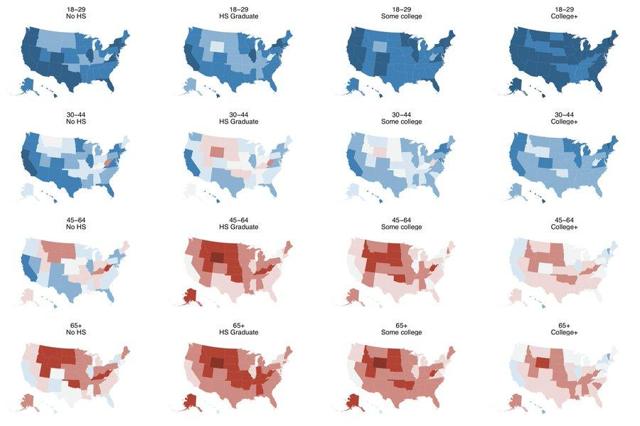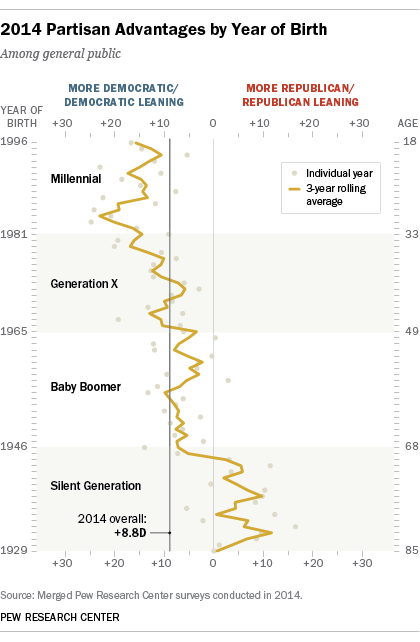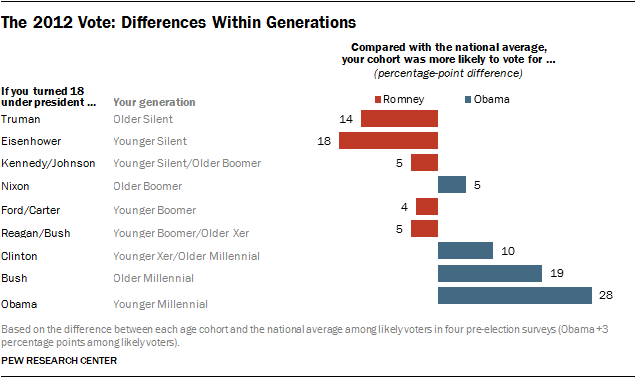For party voting preference, which is more important, age or education? Looks like we have an answer
For party voting preference, which is more important, age or education? Looks like we have an answer
For all the slicing and dicing that has been done in voting metrics for 2016 and 2018, one quandary has stood out. We know that higher educational attainment has strongly correlated with voting for Democrats, and we also know that there was a stark age difference in votes between Clinton and Trump in 2016: a majority of voters younger than 45 voted for Clinton, while a majority over 45 voted for Trump.
But the level of educational attainment has not remained static over time. With each passing generation, more and more students are getting a college degree, and advanced degrees as well.
So are the voting patterns mainly showing us that more younger voters have college degrees? Or is it really about generational experience? For example, is a Silent Generation or Boomer college graduate more likely to vote Democrat than a GenXer or Millenial with no college? This week I finally saw a graphic that spells out the answer, and here it is:

Age is more decisive, hands down. The only anomaly that even comes close is that voters aged 30 to 44 with a high school degree were only slightly more likely to vote Democratic than voters aged 45 to 64 without a high school degree.
Now, before you draw the conclusion that voters grow more conservative with age, remember that the Greatest Generation voted Democratic until the day they died. And keep in mind this demographic of the 2014 vote:

Mid-GenXers voted GOP just as much as early Boomers, and more so than mid-Boomers (who have always skewed slightly Democratic). And late Boomers and early GenXers have voted more GOP than either early or mid-Boomers. The same pattern also shows up in the demographics of the 2012 Presidential vote:

By 2020, most of the very-right wing (and very pro-Trump) Silent Generation cohort is going to have passed from the scene.

The bottom chart seems to imply that, with exceptions, people vote for the party in the WH when they were 18.
I think I can see why Nixon and Bush would be exceptions. Why so Truman unless voters growing more conservative is a factor?
The silent generation were heavily effected by the 74-98 violent crime wave(adjusted for demo, other crime was rising before that, but the Boomers large cohort had a lot to do with that…..though it influenced a guy to make death wish so lol………..). They dropped out of the democratic party heavily during the mid-late 80’s setting the stage for the Republican revival as the old Democratic coalition since Bryan of western european southern US, mexican expats and eastern/southern european immigrants fell apart. Republicans who opposed pax americana before 1929, now was fully onboard and opened them up to evangelicals which the silent generation probably felt guilty as they really powered the modern sex depraved era.
Politics is too vast for the idiotic left/right, liberal/conservative nonsense. I vote democratic mainly because of eco issues despite not liking their pandering to non-white’s to fill in the gap. There are 50% of the white vote up north of the mason/dixon that don’t vote, live in resource constrained areas and need a reason to believe. The ag bust is not getting any better. Trump has failed there. We are seeing it in rural Wisconsin,Michigan and Iowa. Bring the eco-nationalism with a CONUS alliance with the mexicans and Hellenes in the city, almost creating a new New Deal coalition based on racial separation in the family and unity in commerce. It will squeeze out of the blacks and southern zionists evangelicals who I find a waste of time.
“The silent generation were heavily effected by the 74-98 violent crime wave…”
But not the GI generation?
The Silents have voted Republican (HEAVILY) throughout their entire lives, not just starting in the 1970/80s.
JackNYC:
Welcome to Angry Bear. First-time comments always go to moderation to weed out spam, spammers, and advertising.